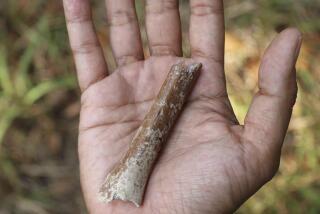Hominid Fossils Fill Gap in European Evolution
WASHINGTON — Fossils unearthed in Spain and dated at 780,000 years may be the oldest evidence yet of human-like creatures in Europe. The discovery fills a major gap in human evolutionary history, experts say.
Thirty-six fossils of hominid bones along with primitive stone tools were found in caves near Burgos in the Atapuerca region of northern Spain by a group of Spanish scientists. A new technique set the age of the specimens at least 200,000 years older than any other human-like fossil found in Western Europe.
“If the date for this material is correct, then it is an extremely exciting discovery,” said Alison Brooks, a George Washington University scientist and faculty member of the Smithsonian’s Institute of Human Origins.
“This finding means there may have been pre-humans widespread in Europe at a very early age, a quarter of a million years earlier than we thought,” said Brooks.
Two reports on the findings are to be published today in Science, the journal of the American Assn. for the Advancement of Science.
Million-year-old fossils of hominids--extinct creatures of the extended ancestral family of modern humans--have been found in Africa, the Middle East, Asia and as far west as Georgia in the former Soviet Union. But nothing older than about half a million years had ever been found in Europe. It was a hominid fossil void that long has puzzled experts and confounded theories of human evolution and migration.
But the finding by a team led by Eudald Carbonell of the University of Tarragona forces a rethinking of very early European history.
Carbonell and his team found the specimens in an abandoned railway trench in a soil and rock deposit known as Gran Dolina.
More to Read
Sign up for Essential California
The most important California stories and recommendations in your inbox every morning.
You may occasionally receive promotional content from the Los Angeles Times.










